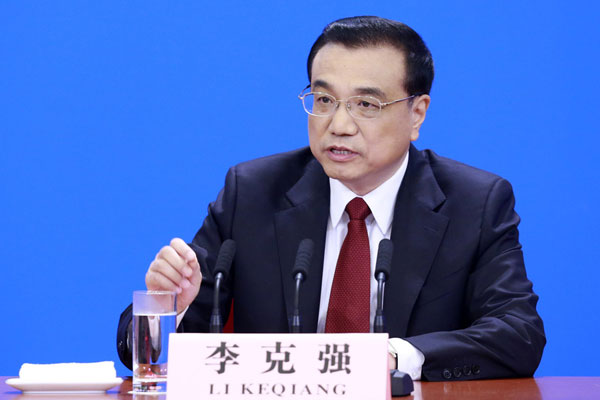 |
|
Premier Li Keqiang answers media questions at a news conference after the closing meeting of the fourth session of China's 12th National People's Congress at the Great Hall of the People in Beijing, March 16, 2016.. [Photo by Feng Yongbin/chinadaily.com.cn] |
Li Keqiang: There are broad interests between China and the United States. There are also some differences between the two countries, and some differences could be quite sharp. There is no need to deny this. For some time it seems that many people have been talking about differences between the two countries, yet at the same time have overlooked one very important thing that happened last year, that is China became the United States top trading partner, with two-way trade reaching $560 billion. This in itself shows that the common interests between the two countries are constantly expanding, and (the common interests) far outweigh their differences.
As for how to ensure the healthy development of China-US ties, I believe both countries need to act in keeping with the principles of equality and mutual benefit. Currently the two countries have stated readiness to press ahead with Bilateral Investment Treaty negotiations. China, on its part, will give US investors wider market access in a gradual manner, but we hope such openings would be mutual, and the BIT negotiations should proceed on the basis of seeking mutual benefit. I believe the common interests between us will constantly expand. As for the differences between the two countries, there are up to 100 various dialogue and exchange mechanisms between China and the US. As long as the two sides act with good faith and properly manage their differences, I believe our common interest will further expand. And as our cooperation expands, the number of differences may naturally rise, but the percentage of differences in the overall China-US relationship will only come down. Broader cooperation serves the interests of both countries and the world.
Business cooperation between our two countries has always been mutually beneficial, something that I believe the US business people know best. As for the ongoing general election in the US, it has been lively and has caught the eyes of many. I believe that no matter, in the end, who gets into the White House, the underlying trend of China-US ties will not change. It has been several decades since the two countries established diplomatic relations, and the relationship has seen more than a fair share of ups and downs, but it has been always moving forward, which I believe is the underlying trend.